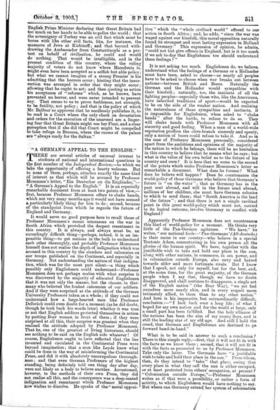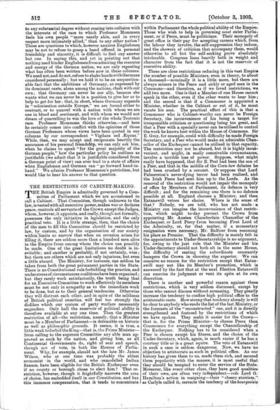• " A GERMAN'S APPEAL TO TEE ENGLISH."
THERE are several articles of unusual interest to students of national and international questions in the first number of the Independent Review,—to which we take the opportunity of offering a hearty welcome. But to none of them, perhaps, attaches exactly the same kind Of interest as that which will be aroused by Professor Mommsen's letter, "Em Deutscher an die Englander,"— " A German's Appeal to the English." It is an especially remarkable document from at least two points of view,— first, because Professor Mommsen offers to shake hands, which not very many months ago it would not have seemed a particularly likely thing for him to do ; second, because of the standpoint from which he regards the future of England and Germany.
It would serve no good purpose here to recall those of Professor Mommsen's recent utterances on the war in South Africa which provoked the deepest resentment in this country. It is always, and always must be, an exceedingly difficult thing—perhaps, indeed, it is an im- possible thing—to get nations in the bulk to understand each other thoroughly, and probably Professor Mommsen himself does not realise the depth of indignation which was aroused in this country by the slanders and calumnies on our troops published on the Continent, and especially in Germany. Not understanding the nature of that indigna- tion, which was for the most part silent—a thing which possibly only Englishmen could understand—Professor Mommsen does not perhaps realise with what surprise it was discovered by the majority of educated Englishmen that it was not only the masses, but the classes, in Ger- many who believed the foulest calumnies of our soldiers. And. if they were surprised at the attitude of the German University Professors taken as a whole; if they could not understand how a large-hearted man like Professor Delbriick could even doubt for a moment (as he did doubt, though he took back his words later) whether it was true or not that English soldiers protected themselves in action by putting Boer women in front of them ; if they were surprised at all this, their surprise was greatest when they realised the attitude adopted by Professor Mommsen. That he, one of the greatest of living historians, should see nothing to be said on the English side whatever ! Of course, Englishmen ought to have reflected that the lies invented and circulated in the Continental Press were beyond imagination ; that a man like Leyds knew what could be done in the way of misinforming the Continental Press, and did it with absolutely unscrupulous thorough- ness and that even German Professors of the highest standing, being definitely told one thing day after day, were not likely as a body to believe another. Accustomed, however, to the methods of their own Press, they did not realise all this, and the consequence was a deep-seated indignation and resentment which Professor Mommsen now Wishes to dissolve. He speaks of the" moral Opposi- tion " which the "whole civilised world" offered to our action in South Africa ; and, he adds, " since the war was waged against our kinsfolk, this moral opposition naturally found its strongest and most lasting expression in Holland and Germany." This expression of opinion, he admits, "could not but give offence in England, but is it too much if we ask to-day that Englishmen too should understand these feelings ? '
It is not asking too much. Englishmen do, we believe, understand what the feelings of a German or a Hollander must have been, asked to choose—as nearly all peoples have to be asked to choose when war breaks out between nations—between British and Boers. Naturally the German and the Hollander would sympathise with their kinsfolk ; naturally, too, the instincts of all the fighting peoples—especially those who, like the Americans, have inherited traditions of sport—would be expected to be on the side of the weaker nation. And realising the naturalness of those sympathies and instincts, it is impossible for Englishmen, when asked to "shake hands" after the battle, to refuse to do so. They will shake hands with Professor Mommsen with all sincerity and good. feeling. When a man of a world-wide reputation proffers the olive-branch sincerely and openly, only a nation of boors could refuse to take it. And so in the case of Professor Mommsen personally, considered apart from the ambitions and opinions of the majority of the nation to which he belongs, there will be no hesitation in this country to believe that he means what he says ; but what is the value of his own belief as to the future of his country and ours ? It is here that we come to the second of the points which make Professor Mommsen's letter so remarkable a document. What does he foresee? What does he believe will happen ? Does he countenance the world-policy of those Germans who believe that Germany's future is "on the water " ; that as Germany has in the past sent abroad, and will in the future send abroad, millions of her children, she must have German colonies to which to send them; that "South America is the land of the future " ; and that there is not a single cardinal point in this great world-policy which must not, carried to its logical outcome, involve Germany in conflict with England?
Apparently Professor Mommsen does not countenance this kind of world-policy for a moment. He thinks very little of the Pan-German agitators. "We have," he writes, " our national fools—' Pan-Germans' (All-deutsche) is their name in our country—who believe in a special Teutonic Adam, concentrating in his own person all the glories of the human spirit. We have, together with the justifiable wish to take and hold our place in the sun, along with other nations, in commerce, in sea, power, and in colonisation outside Europe, also envy and hatred towards older and more fortunate rivals. But I know that I speak, not only for myself, but for the best, and, at the same time, for the great majority, of the German people when I say that, though we have no doubt disapproved, and shall continue to disapprove, a single act of the English nation" (the Boer War), "we yet feel ourselves more nearly akin, and in every respect more intimately allied, to them than to any other nation." And here is his impressive, but extraordinarily difficult, conclusion I look back over a long life ; of what I hoped for my own nation and for the world at large, only a small part has been fulfilled. But the holy alliance of the nations has been the aim of my young days, and is still the leading star of my old age. And still I hold the creed, that German and Englishman are destined to g6 forward hand-in-hand."
What is to be said in answer to such a conclusion ? There is this simple reply,—first, that it will not fit in with the facts as we know them ; second, that it will not, fit in with the facts as presented to us by Professor Mommsen. Take only the latter. The Germans have "a justifiable wish to take and hold their place in the sun." From whom, then, do they intend to " take " that place, seeing that every place in what they call the sun is either occupied, or at least protected from others' occupation, at present ? "Colonisation outside Europe,".7--Professor Mommsen writes as if that were a possibility, or rather a form of actiyity, to which Englishmen would have nothing to say. But where can Germany extend her system of colonisation to any substantial degree without coming into collision with the interests of the race to which Professor Mommsen feels his own people "more nearly akin, and in every respect more intimately allied," than to any other nation? Those are questions to which, however anxious Englishmen may be not to refuse to grasp a hand offered in personal friendship and sincerity, it is difficult to find any answer but one. In saying this, and yet in pointing out that nothing need hinder Englishmenfrom admiring the resource and energy of the German nation, we are only repeating what has often been written before now in these columns. We need not, and do not, refuse to shake hands with Germans considered personally ; but we hold it to be an unquestion- able fact that the ambitions of Germany, as expressed by its dominant caste, alone among the nations, clash with our own ; that Germany can never be our ally, because she wants what we can never be in a position to give her or to help to get for her ; that, in short, where Germany expands in "colonisation outside Europe," we are bound either to contract, or to quarrel with a nation with whom we are one in blood and sentiment, and with whom we would not dream of quarrelling to win the love of the whole Teutonic race. Professor Mommsen thinks otherwise,—and here he certainly comes into conflict with the opinions of those German Professors whose views have been quoted in our columns by our correspondent " Vigilans sed Equus." While, then, we may accept and reciprocate heartily the assurance of his personal friendship, we can only ask him, when he claims to speak "for the great majority of the German people," how the particular policy he outlines as justifiable (we admit that it' is justifiable considered from a German point of view) can ever lead to a state of affairs when Englishman and German can "go forward hand-in- hand." We admire Professor Mommsen's patriotism, but would like to hear his answer to that question.



























































 Previous page
Previous page